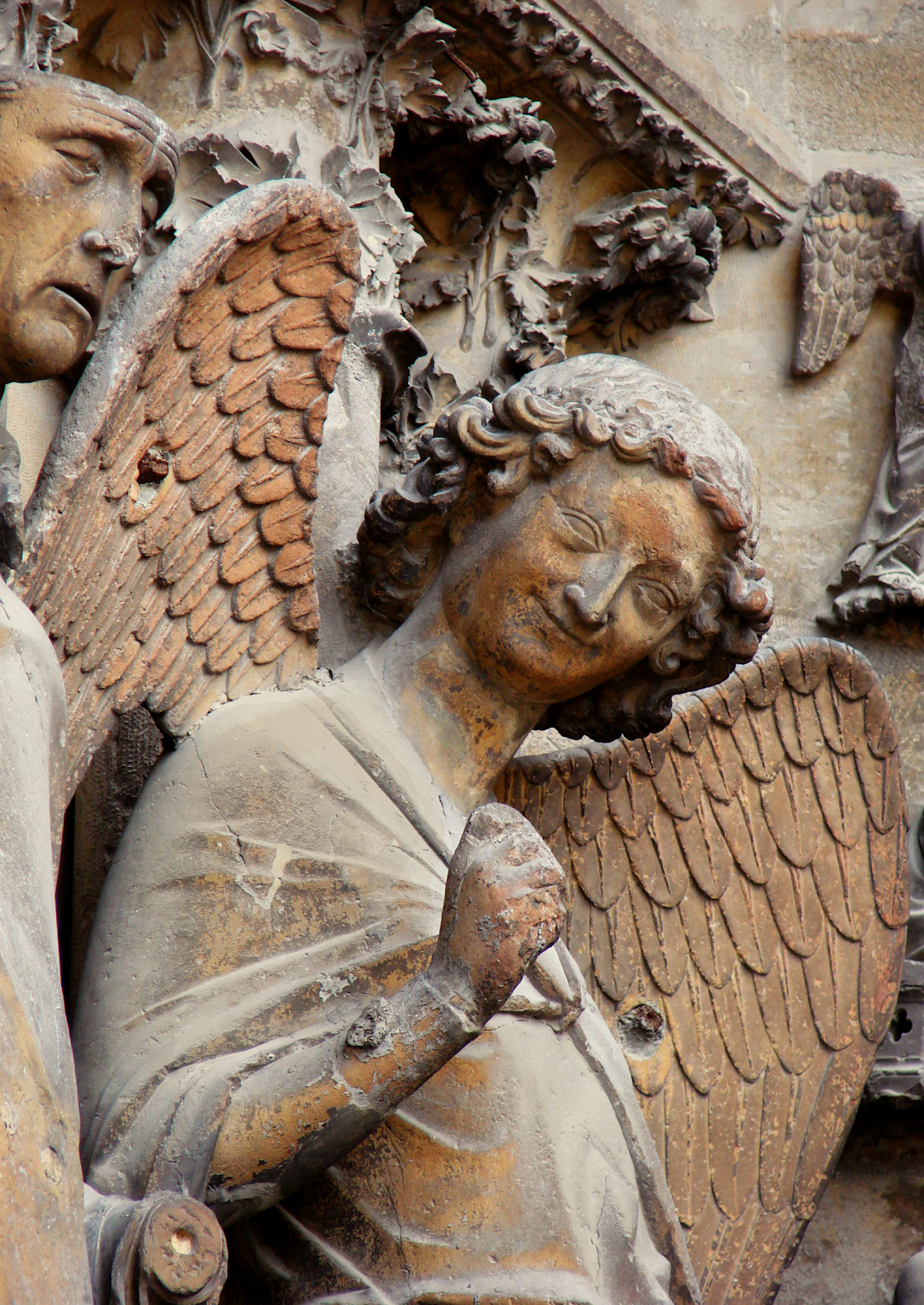fr - en - es
SAINT NOËL 2024
Message de l'Archevêque Dollmann
Le jubilé pour devenir
serviteurs de la joie
Saint Luc,
l’évangéliste de la joie
L’évangile
selon saint Luc qui accompagne la nouvelle année liturgique, se caractérise par
la note de la joie. Ainsi à Noël, l’évangile nous associe à la joie des anges par
le chant du Gloire à Dieu et, après l’Ascension, l’évangile mentionne les
apôtres qui louaient sans cesse Dieu dans le Temple. Cette joie est un des
fruits de l'Esprit-Saint que Jésus nous a obtenu par sa mort et sa
résurrection. Pour le peuple juif, le jubilé voulait être un temps de joie
consacré entièrement à Dieu par la prière mais également par des gestes de
réconciliation comme la remise des dettes, la libération des esclaves ou le
repos de la terre. Mais ces préceptes sont restés en grande partie un idéal.
C’est alors que grandissait l’espérance de la vraie libération, celle qui
serait accomplie par le Messie.
Jésus le
Messie consacré par l’onction de joie
Au
début du ministère public de Jésus, saint Luc évoque sa venue dans la synagogue
de Nazareth où il participa à la prière du sabbat. On lui présenta le livre du
prophète Isaïe, dans lequel il lut le passage suivant : « L’Esprit du Seigneur
est sur moi parce que le Seigneur m’a consacré par l’onction. Il m’a envoyé
porter la Bonne Nouvelle aux pauvres […] proclamer une année de grâce du
Seigneur » (Is 61,1-2). L’assemblée comprenait ces paroles d’Isaïe comme une
annonce du Messie. Et voici qu’après avoir remis le rouleau de l’Écriture au
servant, Jésus proclama : « Aujourd’hui, s’accomplit à vos oreilles ce passage
de l’Écriture » (Lc 4,21).
Le
chrétien, serviteur de la joie de Dieu
Le
jubilé tel que l’a annoncé Isaïe s’est ainsi accompli en Jésus. Lui le Fils de
Dieu a annoncé aux hommes la libération totale, a guéri les malades et rendu la
vue aux aveugles. Jésus a signifié par-là l’avènement du salut, le don de la
vie éternelle qu’il a offert définitivement à l’humanité par sa mort et sa
résurrection. Pour les chrétiens, les jubilés seront toujours en référence à ce
salut que Jésus le Christ a porté au monde. Accueilli ainsi, le jubilé de 2025
est une école de la joie fondée selon le souhait du Pape, sur l’espérance.
Celle-ci « bien plus grande que les satisfactions quotidiennes et
l’amélioration des conditions de vie, nous porte par-delà des épreuves et nous
pousse à marcher sans perdre de vue la grandeur du but auquel nous sommes
appelés, le Ciel » (Bulle d’Indiction Spes non confundit, n.25, 9 mai 2024).
Joyeuses Fêtes
de la Nativité du Christ et Sainte Année jubilaireX
+Vincent
DOLLMANN Archevêque de Cambrai Assistent Ecclésiastique MEC-WUCT
 HOLY CHRISTMAS 2024
HOLY CHRISTMAS 2024
Message from Archbishop Dollmann
The jubilee to become servants of joy
Saint Luke, the evangelist of joy
The Gospel according to Saint Luke, which accompanies the new liturgical year, is characterized by the note of joy. Thus at Christmas, the Gospel associates us with the joy of the angels by singing the Glory to God and, after the Ascension, the Gospel mentions the apostles who continually praised God in the Temple. This joy is one of the fruits of the Holy Spirit that Jesus obtained for us by his death and resurrection. For the Jewish people, the jubilee was intended to be a time of joy devoted entirely to God through prayer but also through gestures of reconciliation such as the forgiveness of debts, the liberation of slaves or the rest of the earth. But these precepts have remained largely an ideal. It was then that the hope of true liberation grew, that which would be accomplished by the Messiah.
Jesus the Messiah consecrated by the anointing of joy
At the beginning of Jesus’ public ministry, Saint Luke recalls his coming to the synagogue of Nazareth where he participated in the Sabbath prayer. He was presented with the book of the prophet Isaiah, from which he read the following passage: “The Spirit of the Lord is upon me, because the Lord has anointed me. He has sent me to bring good news to the poor […] to proclaim the year of the Lord’s favor” (Is 61:1-2). The assembly understood these words of Isaiah as an announcement of the Messiah. And behold, after giving the scroll of Scripture to the servant, Jesus proclaimed: “Today this Scripture has been fulfilled in your hearing” (Lk 4:21).
The Christian, servant of God’s joy
The jubilee as announced by Isaiah was thus fulfilled in Jesus. He, the Son of God, announced total liberation to men, healed the sick and restored sight to the blind. Jesus thereby signified the advent of salvation, the gift of eternal life that he definitively offered to humanity through his death and resurrection. For Christians, jubilees will always refer to this salvation that Jesus Christ brought to the world. Welcomed in this way, the jubilee of 2025 is a school of joy founded, according to the Pope’s wish, on hope. This “much greater than daily satisfactions and the improvement of living conditions, carries us beyond trials and pushes us to walk without losing sight of the grandeur of the goal to which we are called, Heaven” (Bull of Indiction Spes non confundit, n. 25, May 9, 2024).
Happy Feast of the Nativity of Christ and Holy Jubilee Year
+Vincent DOLLMANN, Archbishop of Cambrai, Ecclesiastical Assistant UMEC-WUCT
SANTA NAVIDAD 2024
Mensaje del
Arzobispo Dollmann
El jubileo para convertirse
servidores de la alegría
San Lucas, evangelista de la alegría
El Evangelio según san Lucas, que acompaña el nuevo año
litúrgico, se caracteriza por una nota de alegría. Así en Navidad, el evangelio
nos asocia con la alegría de los ángeles a través del cántico de Gloria a Dios
y, después de la Ascensión, el evangelio menciona a los apóstoles que
constantemente alababan a Dios en el Templo. Este gozo es uno de los frutos del
Espíritu Santo que Jesús obtuvo para nosotros mediante su muerte y
resurrección. Para el pueblo judío, el jubileo quería ser un tiempo de alegría
dedicado enteramente a Dios a través de la oración pero también a través de
gestos de reconciliación como el perdón de las deudas, la liberación de los
esclavos o del resto de la tierra. Pero estos preceptos siguieron siendo en
gran medida un ideal. Fue entonces cuando creció la esperanza de la verdadera
liberación, la que sería realizada por el Mesías.
Jesús el Mesías consagrado por la unción de la alegría
Al inicio del ministerio público de Jesús, san Lucas
evoca su llegada a la sinagoga de Nazaret donde participó en la oración del
sábado. Le presentaron el libro del profeta Isaías, en el que leyó el siguiente
pasaje: “El Espíritu del Señor está sobre mí, por cuanto el Señor me ha ungido.
Me ha enviado a llevar la Buena Nueva a los pobres […] a proclamar un año de
gracia del Señor” (Is 61,1-2). La asamblea entendió estas palabras de Isaías
como un anuncio del Mesías. Y he aquí, después de haber entregado el rollo de
la Escritura al criado, Jesús proclamó: “Hoy se ha cumplido este pasaje de la
Escritura que has oído” (Lucas 4,21).
El cristiano, servidor de la alegría de Dios
El jubileo anunciado por Isaías se cumplió así en Jesús.
Él, el Hijo de Dios, anunció a los hombres la liberación total, curó a los
enfermos y devolvió la vista a los ciegos. Jesús significó así el advenimiento
de la salvación, el don de la vida eterna que ofreció definitivamente a la
humanidad mediante su muerte y resurrección. Para los cristianos, los jubileos
siempre serán en referencia a esta salvación que Jesucristo trajo al mundo. Así
acogido, el jubileo de 2025 es una escuela de alegría fundada según el deseo
del Papa, sobre la esperanza. Esto “mucho mayor que las satisfacciones
cotidianas y la mejora de las condiciones de vida, nos lleva más allá de las
pruebas y nos empuja a caminar sin perder de vista la grandeza de la meta a la
que estamos llamados, el Cielo” (Bulle of Indiction Spes non confundit, n. 25,
9 de mayo de 2024).
Felices Fiestas de la Natividad de Cristo y Año
Santo Jubilar
+Vincent DOLLMANN Arzobispo de Cambrai, Asistente Eclesiástico UMEC-WUCT




















